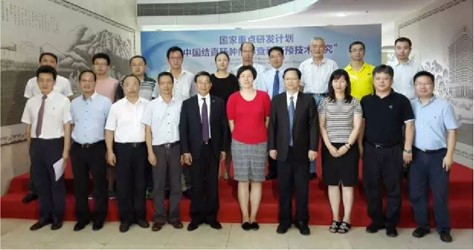
A Colorectal Cancer Screening Program Has Been Officially Launched by The Ministry of Science and Technology
Colosafe® | Creative Biosciences | 2017.09.03
Time: August 11, 2017
Place: Building No#1 at The Sixth Affiliated Hospital of Sun Yat-sen University
Event: Led by Prof. Lan Ping, president of the Sixth Affiliated Hospital of Sun Yat-sen University. Chinese Colorectal Cancer Screening and Intervention Technology Research Project, the national key research and development program organized by the Ministry of Science and Technology of China is officially launched. The project includes competitive units and teams from China's five largest colorectal cancer screening bases of Beijing, Shanghai, Guangzhou, Tianjin and Zhejiang.

The following institutions are employed:
• The Sixth Affiliated Hospital of Sun Yat-sen University
• Changhai Hospital affiliated to the Second Military Medical University
• Shanghai Center for Disease Control and Prevention
• The Second Affiliated Hospital of Zhejiang University
• The First Affiliated Hospital of Sun Yat-sen University
• Cancer Hospital Affiliated to Sun Yat-sen University
• People's Hospital affiliated to Peking University
• Affiliated Cancer Hospital of Peking University
• Tianjin Nankai Hospital
• Zhongshan Hospital affiliated to Fudan University

There are over one hundred experts from the above-mentioned institutions attending the event. The launch also attracts the attention of nearly 20 medias from the province, including Guangzhou Daily, Nanfang Daily, Yangcheng Evening News, Nanfang Metropolitan Daily, Science and Technology Daily, Guangdong TV, Guangzhou TV, Nanfang TV and others.
Colorectal cancer is one of the most effective screened cancers. With the implemented CRC screening, the incidence and death rates have declined in the United States for 10 consecutive years. However, in Beijing, Shanghai, Guangzhou and other metropolitan cities in China, the incidence of colorectal cancer has jumped to the second place among all cancers, and 90% of the patients receiving medical treatment are in the middle or advanced stage. The low rate of early diagnosis (10) is an important reason for the high mortality of colorectal cancer patients in China where questionnaire, fecal occult blood test and colonoscopy are the traditional screening methods which have the following problems: ① The accuracy of questionnaire is very low; ② Accuracy of fecal occult blood test is poor; ③ The colonoscopy compliance is not high in patients with primary screening positive result; ④ Colonoscopy tends to miss the diagnosis of right colon tumor. The above reasons lead to the limited screening outcome in China. Therefore, it is urgent to establish more cost-effective screening methods. The research objectives of this project are to develop a new colorectal cancer screening technology, develop a screening program suitable for The Chinese population, establish an intervention program for high-risk groups, and develop new guidelines for colorectal cancer screening and intervention in China. The screening program will eventually benefit nearly 50,000 people!
Professor Hongzhi Zou oversees project No 1 of the above-mentioned program. Dr. Zou has worked at Mayo Clinic for more than 10 years and has invented non-invasive screening technology for colorectal cancer. This novel technology can greatly improve the detection accuracy by detecting the specific gene methylation status of the cancerous cells in the stool. Dr. Zou has successfully developed Colosafe® which is a stool DNA test kit for colorectal cancer. Colosafe® can detect up to 90% of early colorectal cancer and more than 60% of precancerous adenomas with a specificity of 93%. According to Zou, the positive predictive value increased by 35 percentage points compared with FOBT, to 50 percent, which means, out of 100 people who are tested positive, 50 would be found to have adenoma or colorectal cancer after colonoscopy. In this project, Colosafe® will play an important role and certainly live up to the great trust of the country!
Finally, we would like to thank everyone for your continuous trust and support.
